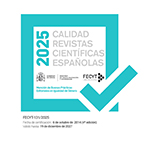Poder totalitario y libertad de conciencia en el primer franquismo: relaciones entre el Opus Dei y la Falange
Resumen
Este artículo pretende realizar un acercamiento a la relación del Opus Dei con la Falange en la posguerra española. Trata sobre la opinión del fundador del Opus Dei con respecto al nazismo y al fascismo, sobre la participación de jóvenes del Opus Dei en la División Azul y en el sindicato estudiantil falangista, y en particular sobre el caso de Eduardo Alastrué Castillo. Entre las fuentes consultadas he investigado principalmente en el Archivo General de la Administración (Alcalá de Henares) y en el Archivo General del Opus Dei (Roma), y también he consultado periódicos (ABC, Arriba, La Vanguardia) y revistas (Ecclesia, Razón y Fe, ¿Qué pasa?) de los años cuarenta
Descargas
Descarga artículo
Licencia
La revista Cuadernos de Historia Contemporánea, para fomentar el intercambio global del conocimiento, facilita el acceso sin restricciones a sus contenidos desde el momento de su publicación en la presente edición electrónica, y por eso es una revista de acceso abierto. Los originales publicados en esta revista son propiedad de la Universidad Complutense de Madrid y es obligatorio citar su procedencia en cualquier reproducción total o parcial. Todos los contenidos se distribuyen bajo una licencia de uso y distribución Creative Commons Reconocimiento 4.0 (CC BY 4.0). Esta circunstancia ha de hacerse constar expresamente de esta forma cuando sea necesario. Puede consultar la versión informativa y el texto legal de la licencia.











